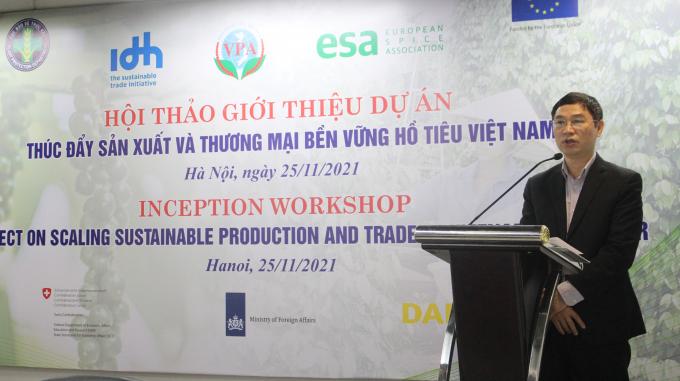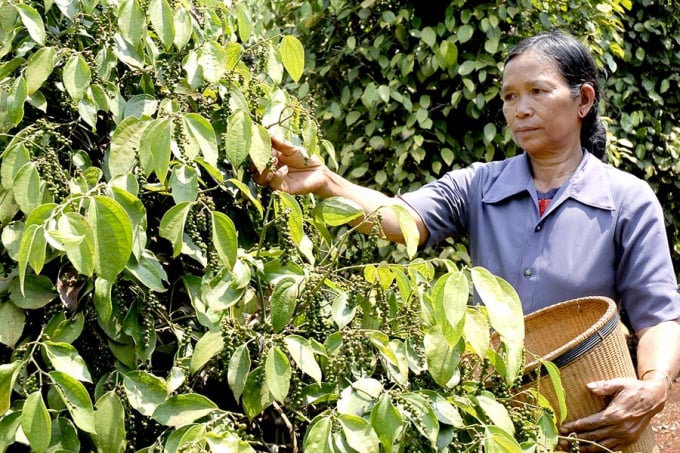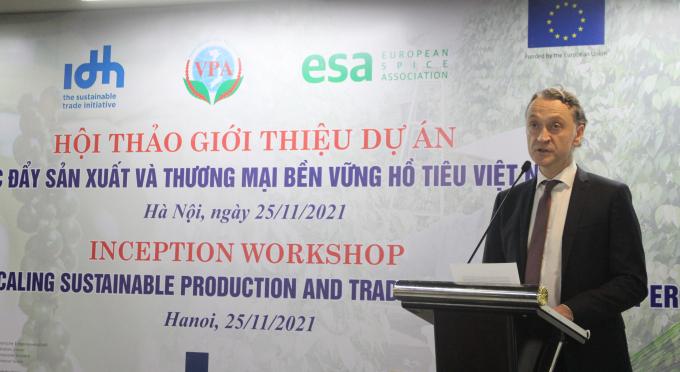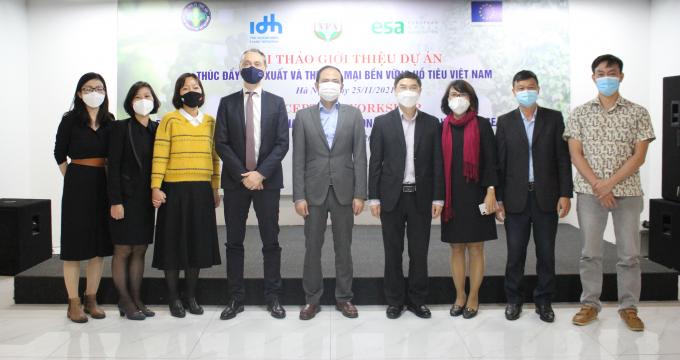November 22, 2025 | 19:03 GMT +7
November 22, 2025 | 19:03 GMT +7
Hotline: 0913.378.918
November 22, 2025 | 19:03 GMT +7
Hotline: 0913.378.918
On November 25th, the Department of Plant Protection (Ministry of Agriculture and Rural Development - MARD) in collaboration with the Sustainable Trade Initiative (IDH) and the Vietnam Pepper Association (VPA) held a workshop to introduce the project. “Promoting sustainable production and trade of Vietnamese pepper”.

Mr. Nguyen Quy Duong, Deputy Director of Plant Protection Department (MARD) spoke at the workshop. Photo: Trung Quan.
According to Mr. Huynh Tien Dung, Country Director of IDH Vietnam, the project is within the framework of the ASEAN Regional Integration Support from the EU (ARISE Plus), assisting the Government of Vietnam in achieving the benefits from new bilateral and regional trade commitments, focusing on the implementation of the EVFTA, promoting the exportation of high-quality products and services from Vietnam to the EU.
The project will have its attention on small and medium pepper enterprises, thereby bringing benefits to smallholder farmers. Vietnam is the world's largest black pepper producer and exporter (accounting for 60% of world trade) with output in 2019 reaching 250,000 tons, accounting for approximately 45% of pepper imports into the EU.
Despite having a large export volume, Vietnam's pepper industry is currently facing challenges such as reducing international competitive advantages in terms of quality and price, notably the unreasonable use of agrochemicals, therefore only 40% of pepper production volume can meet import markets' requirements of residues.
Vietnamese pepper farmers and small and medium enterprises are facing a serious risk of losing market share if quality control measures following European and US standards are not put in place.

The project implementation period is expected to be from 2021 to 2023. The location will be in the provinces of Dak Lak, Dak Nong and Gia Lai. Photo: TL.
On that basis, the project aims to increase income for farmers, contribute to improving the environment in Vietnam, and promote sustainable production and trade for Vietnamese pepper: increase 15% in income from pepper production among 20% of farming households participating in the project; increase 5% of the area where farmers apply sustainable production standards; increase 5% in certified pepper of companies participating in the project; increase 15% of pepper production volume that meets EU market residue standards.
The project implementation period is expected to be from 2021 to 2023. The location will be in the provinces of Dak Lak, Dak Nong and Gia Lai. The total capital (non-refundable aid) is over 1 million euros (800,000 euros from the EU and 262,882 euros from IDH Netherlands).
Regarding the project organization and implementation, IDH Vietnam together with the VPA will closely coordinate with the Plant Protection Department to integrate the activities within the approved project framework with the approved plan of the pepper public-private partnership group. The goal is to intercept and solve the main problems concerning the current development of Vietnamese pepper, particularly solutions to improve the management of responsible use of agrochemicals.
As shared by Mr. Matthieu Penot, European Commission Attaché to Vietnam, many processing companies of the EU have come to Vietnam to invest, bringing with them modern technology and production know-how. They fully understand the strict requirements of the European market. The EU countries have the same requirements for quality control and pesticide residue thresholds, so the question is how Vietnam's pepper industry can improve and maintain its inherent competitive advantages.

Mr. Matthieu Penot, European Commission Attaché to Vietnam, believes that the project will make positive contributions to helping Vietnam's pepper maintain competitive advantages. Photo: Trung Quan.
The project will serve as a place to share knowledge on good agricultural practices that ensure traceability and meet EU markets’ requirements, help Vietnam gain more grand opportunities after signing the EVFTA and non-tariff access to major commodity markets in the world.

The units participating in the project commit to closely cooperating to effectively implement the set goals. Photo: Trung Quan.
Mr. Nguyen Quy Duong, Deputy Director of Plant Protection Department, suggested that the VPA continue to encourage businesses in the association to organize methodical activities following the project's goals.
Localities should closely coordinate with IDH, associations, businesses, and farmers to carry out the project on schedule, develop plans to integrate into programs that are currently under implementation. Units participating in the project will make a preliminary assessment once every three months to promptly remove difficulties and obstacles.
Translated by Samuel Pham

(VAN) Official Telegram No. 226/CD-TTg, issued on November 21, 2025, mandates enhanced management and utilization of national reserves to support flood response and relief efforts in the Central Region.

(VAN) The Politburo has demanded a high concentration of efforts on urgent relief tasks, ensuring absolute prevention of hunger, cold, and shortages of clean water or medicine among the population.

(VAN) Water resources during the 2025–2026 dry season in the Mekong River Basin basically meet domestic use and production needs, but localized shortages may still occur due to saltwater intrusion.

(VAN) Vietnam and Japan have committed to deepening cooperation on projects under the Joint Crediting Mechanism (JCM), improving waste management, and advancing the circular economy.

(VAN) Digital transformation is becoming a core driver of proactive, precise, and safer management of dams and reservoirs nationwide.

(VAN) This assistance supports people who temporarily relocate or evacuate, as well as communities affected by major storms from late September to now.

(VAN) Viet Nam will host the 8th ASEAN Heritage Parks Conference, bringing together over 320 delegates and reaffirming its role in regional nature conservation.